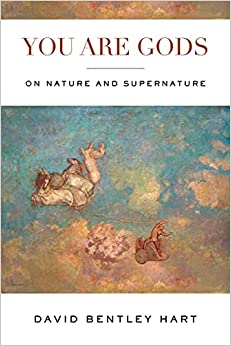Hart begins his first essay, “Waking the Gods – Theosis as Reason’s Natural End,” with a thought experiment which is basically the mirror image of the Ship of Theseus. Imagine a rabbit. A magician, through some sorcery, turns the rabbit into a turnip. The question is whether the rabbit still can be said to exist. Has the rabbit been transformed into a turnip, or has the rabbit been annihilated and its constituent atomic parts been reorganized into a turnip? Alternatively, what if the magician turns the rabbit into an angel (heavenly or demonic)? Has the rabbit become an angel, or, once again, has the rabbit ceased to exist and an angel been conjured up in the same geographic location? In answering this second question, Hart makes his logical jump – “if there is no latent angelism in rabbits, even of the most purely potential kind, then no real metamorphosis has occurred at the level of discrete substances or identities. All that has happened is the murder of a harmless bunny and the summoning of a potentially very dangerous spiritual creature to take its place.
Hart’s proposition is that “nothing can ever become anything other than what it already is, at least potentially. A discrete substance can through various states proper to itself . . . . But it can never become something truly extrinsic to itself without ceasing to be what it was.” p.3. The caterpillar can be transformed into a butterfly because the butterfly was always there, just as the acorn is not annihilated in becoming an oak.
The error that modern thinkers make is in our understanding of causality. A logical cause is not exactly the same as a scientific cause. Rather, a logical cause is more of an explanation or a rationale. It is a description of the rational relationships between and among the objects of inquiry. Therefore, to speak of a final cause or a telos is to speak of the inherent natural limitation of the particular possibility originally contained within the object and not extrinsically imposed upon it. The final cause of an acorn is to become an oak. The oak is the natural limitation contained within the acorn. The final cause of an acorn, however, is NOT to become a great ship. Whatever continuity that there is between an oak and a ship, however, is found only in their common material substrate at the level of sheer material plasticity. In becoming a ship, the oak ceases to exist. Therefore, a ship is an extrinsically imposed condition upon the acorn, and thereby not a final cause of the acorn.
In conclusion, Hart reminds us that a “rabbit cannot be – and therefore cannot become – a turnip, any more than a circle can be – or can become – a square. What Hart states without saying is that if our natural end is to partake of the divine nature (2 Peter 1:4) then that divine nature must necessarily have been present within our humanity from the beginning (Gen. 1:27). Or, looked at another way, if the divine nature is extrinsically imposed us, then within that imposition we cease to exist. What does God accomplish by “saving us” or giving us a divine nature if within that gift, we cease to be who we are?

